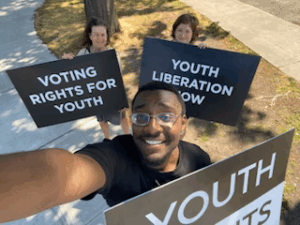“We have a saying in this movement that we don’t trust anyone over the age of 30,” said environmental activist Jack Weinberg in 1964 during an interview with a reporter from the San Francisco Chronicle. This famous quote from the anti-establishment days of the 1960s eventually was memorialized simply as “don’t trust anyone over the age of 30.” Weinberg later went on to say that this wasn’t actually something that he believed; he only wanted to brush off this reporter, who believed that the environmental activists were actually part of communist and other “sinister” groups. Other members of the movement noticed that Weinberg’s statement infuriated older Americans, and so it went on to become a common saying within the movement and a focal point for reporters aiming to attack the younger generation of America for exclusion and discrimination against older people.
This story has since become emblematic of generational conflict in America. But young people today are in a battle with their elders just as the young people of the anti-establishment movement of the 1960s were. Today, just about everybody has heard Generation Z’s snarky comeback “OK Boomer” against old timers. It is a very simple jab, yet also very effective at getting the attention of the older folks that Generation Z and Millenials intend to call out. This remark has been used to shoot down different types of bigotry such as homophobia, racism, and xenophobia that is common within older generations. As expected, the use of the word “boomer” has faced a large amount of criticism, namely from older people and even young conservatives, who better identify themselves with older generations than their own due their traditionalist beliefs. Bob Lonsberry, a radio talk host for New York’s WHAM and WSYR radio stations went as far as to call “boomer” “the n-word of ageism”.
Nobody likes to be called names or made fun of, but do the people targeted by the moniker really have a fair reason to be upset? For almost as long as millenials and gen-z’ers have been alive, they have faced almost endless amounts of nagging and insults from their elders. And for what? Having new ideas? Having access to technology that helps bring people together and solve problems? For having different interests than their parents and grandparents did? Culture changes over time and people from previous generations faced the same kind of disapproval young people today do from their elders. The youth of yesterday were criticized for the cultural staples of their time: rock n’ roll was considered to be “for satanists”, television was said to be influencing children much like video games are said to be today, and even jazz music, which today is considered to be one of the softest genres around was heavily censored by disapproving adults, mostly of the senior age, and labeled “the devil’s music”.
In the end, usage of “ok boomer” really isn’t much different than Jack Weinberg’s “don’t trust anybody over the age of 30”. While it is intended to stir up older people, it is not usually used to show hatred. It is simply a cry out of frustration by more progressive young people who are irritated with traditional, old-fashioned people holding them back from what they desire. Just as Weinberg’s environmental campaign highlighted, ultimately the world truly does belong to young people, and it is the responsibility of the older people who are in charge of the nation to ensure that the youth of today are provided with the best possible world to live in. Young people have made it very clear that they are unhappy with the negligent efforts that America’s seniors and politicians are putting forth today, and ultimately it is this understandable frustration that led to the “ok boomer” trend.





